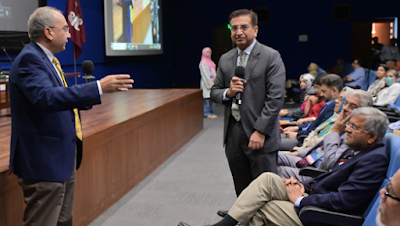Pakistan urged to expand robotic surgery network
IV Report
KARACHI: A two-day international symposium on robotic surgery, hosted by the Sindh Institute of Urology and Transplantation (SIUT), highlighted the potential of this technology to improve patient outcomes and stressed the need for its expanded adoption across Pakistan.
The symposium, held on February 14 and 15, featured discussions, hands-on training, and collaborative efforts to advance surgical expertise. SIUT has been at the forefront of robotic surgery in Pakistan since 2017, with over 600 procedures performed using a shared Da Vinci robotic system at Civil Hospital Karachi, according to a SIUT press releases.
“In 2021, SIUT established its own Kassim Parekh Robotic and Laparoscopy Unit, featuring the Versius robotic surgical system, which has performed over 2,000 successful surgeries in urological, hepatobiliary, and colorectal segments.”
International and local speakers, including Professor Khurshid Guru from the US, Dr Nauman Zaffar from Lahore, and Professor Adeel Khan from the University of Washington, shared their experiences and highlighted the transformative impact of robotics on modern surgery.
Professor Guru spoke on the “revolutionary” role of robotics
in pelvic surgery, while Dr Zaffar discussed the cost-effectiveness
and feasibility of robotic surgery in Pakistan’s public sector hospitals.
The conference covered a wide range of topics, including the cost-effectiveness and feasibility of robotic surgery in Pakistan's public sector hospitals, robotic liver transplantation, and urological, hepatobiliary, general, and gynecological robotic surgery applications.
The concluding session called for expanding the network of robotic surgery across Pakistan, emphasising its potential to provide relief and cure to the ailing population. Speakers noted that robotic surgery is a state-of-the-art technology that can improve patient outcomes.
The outgoing president of the Pakistan Robotic Society, Prof M Saeed Quraishy, and Dr Irfan Rizvi, a visiting surgeon from the US, highlighted that robotic-assisted procedures are accessible and free of charge at SIUT, regardless of patients' socio-economic backgrounds.
Other speakers, including Badar Mian, Dr Sajida Qureshi, Andre De Silva, Javaid Iqbal, Vipul Patel, and Rashid Mazhar, discussed various aspects of robotic surgery, including accuracy, minimum time frame, ethical considerations, training, and infrastructure.
Anila Kazmi, Dr Riaz Leghari, and Naveed Mehar also spoke at the conference, which was attended by experts and surgeons from Pakistan and abroad.
Saad Aldousari of Kuwait along with Pakistan’s Naresh Kumar, Harris Qureshi, Shahid Rasool, Shadab Khan, and Samia Malik—shared their experiences in urological, hepatobiliary, general, and gynecological robotic surgery applications.
A diverse panel of specialists also held, with Rehan Mohsin of SIUT, C Mallikarjuna, Pranjul Modi, both from India, on the first day.
Photo courtesy: SIUT









Comments
Post a Comment